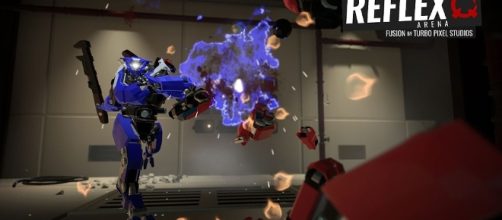Ah, the 90's. Different people remember different things about the decade of VHS tapes and edgy grunge music, but the main thing that stands out to me is the release of Quake, Id Software's 1996 first-person shooter for MS-DOS.
Quake was a revolutionary new development in shooting-game and 3D graphics technology, featuring a fully 3D-modeled game world and an engine capable of true 3D real-time rendering. Gameplay was reminiscent of id Software's previous successes, DOOM and DOOM II, having the player run around maze-like levels full of monsters while picking up weapons, armor, and power-ups along the way.
A fast-paced frag fest
When id Software released an improvement on Quake's multiplayer called QuakeWorld in December of the same year, players started organizing matches over dial-up internet connections to see who could come out on top in a fast-paced frag fest.
A match of Quake was a test of out-aiming, out-maneuvering, and out-smarting your opponents, with weapons capable of near-instantly blasting a player to virtual meaty chunks. Quake's multiplayer featured many similarities to its singleplayer experience, including running around the area collecting items - except that one wrong step could mean eating a rocket to the face from the guy who beat you, to that Quad Damage powerup and losing all of your hard-earned weapons.
This high-speed intensity attracted competitive spirits all over the world to host and participate in LAN events featuring cash (and in one famous case, car) prizes.
Setting the standard
Quake's action-packed experience quickly gained in popularity, and id Software took notice. In 1997, Quake II was released, which featured a more fleshed-out story for singleplayer and expanded on the original's multiplayer. However, after the release of Quake III Arena in 1999, the standard for arena-style first person shooter gameplay was set to an entirely new level. This installment of the series was almost entirely focused on Quake's famous multiplayer, featuring several new maps right on release that were designed for players to fight each other on, and many improvements to the weapon and powerup system of past Quake games.
But it didn't stop there, as less than a year after Quake III Arena's release, a player-made modification known as Challenge ProMode Arena (or CPMA) was released by a team of competitive Quake enthusiasts as yet another improvement on the Arena FPS experience.
This version featured modified physics that allowed players to move around the arena in new and faster ways, along with a slew of new maps designed to be navigated as such. After the Cyberathlete Professional League announced CPMA as the mod to be used in its tournaments, the golden standard of Quake-style multiplayer was set in stone.
A thriving legacy
Quake III Arena, CPMA, and id Software's later web-based version of Quake III Arena, Quake Live, are still featured in large professional gaming tournaments to this day, including QuakeCon, 125 FPS, and The Electronic Sports World Convention.
Despite a lull in interest by the general gaming population of recent years, the addictive action of the Quake family of games has kept many fans dedicated for over two decades. And the future looks bright for them, due to the notable number of arena-style FPS games that have been recently released or are in development. Bethesda and id Software's own Quake Champions is a continuation of the Quake franchise, featuring the same classic combat while adding elements of class-based games such as Overwatch.
Reflex Arena (pictured) is like a love letter to CPMA, with very similar physics and weapon mechanics to the competitive Quake III Arena mod. Even the latest installment of DOOM, released last year, features gameplay that harkens back to the good old-fashioned shooters that have set the foundation for competitive action gaming as we know it today.
Now may be a better time than ever to get into these games; there are public Discord servers dedicated to any Arena FPS you could think of, from Reflex to Quake Live to QuakeWorld, where enthusiasts congregate to discuss their games of choice and find matches. Even DreamHack has recently started featuring Quake Champions alongside its many other tournaments. The grand-daddy of first-person eSports is back - and better than ever!


